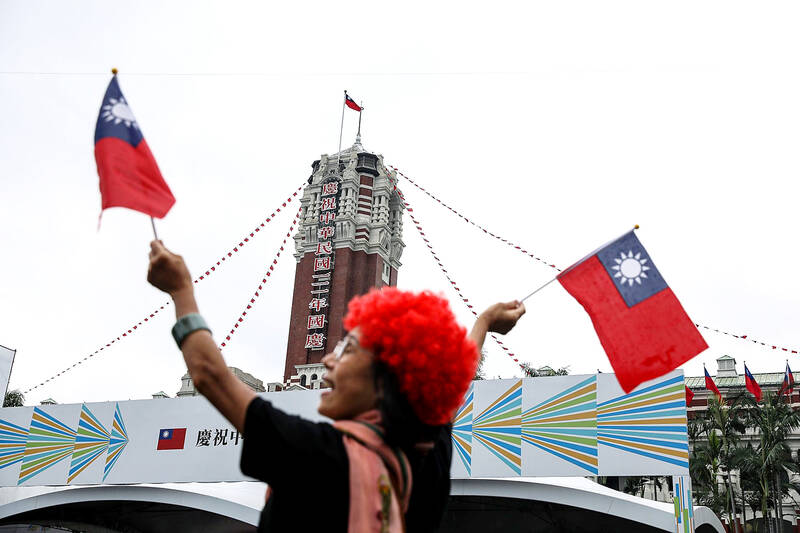Taiwan is likely to post the highest GDP per capita in East Asia, beating South Korea and Japan this year, South Korean monthly magazine BusinessKorea said in a report yesterday, citing the latest IMF estimate.
Taiwan’s GDP per capita is expected to increase to US$35,510 this year from US$33,140 last year, the report said.
That would put the nation’s GDP per capita above South Korea’s expected US$33,590 for the first time since 2003 and above Japan’s US$34,360 for the first time ever, it said.

Photo: I-Hwa Cheng, Bloomberg
South Korea’s GDP per capita is estimated to fall 4 percent this year, while that of Japan is to drop 12.6 percent from last year, the report said.
The report attributed Taiwan’s rapid GDP growth to the government’s intensive support of the local semiconductor industry.
It said Taiwan Semiconductor Manufacturing Co’s (TSMC, 台積電) sales in the third quarter were estimated to have exceeded Samsung Electronics Co’s for the first time, citing industry sources.
TSMC, the world’s largest contract chipmaker, on Friday reported a record quarterly revenue of NT$613.14 billion (US$19.23 billion) for the third quarter, up 14.79 percent from the previous quarter and an increase of 47.85 percent from a year earlier.
Market researcher IC Insights last month estimated that Samsung’s third-quarter revenue would have dropped by 19 percent to US$18.29 billion due to a slump in the memorychip industry.

The Ministry of the Interior (MOI) is to tighten rules for candidates running for public office, requiring them to declare that they do not hold a Chinese household registration or passport, and that they possess no other foreign citizenship. The requirement was set out in a draft amendment to the Enforcement Rules of the Public Officials Election and Recall Act (公職人員選舉罷免法 ) released by the ministry on Thursday. Under the proposal, candidates would need to make the declaration when submitting their registration forms, which would be published in the official election bulletin. The move follows the removal of several elected officials who were

The Republic of China (ROC) is celebrating its 114th Double Ten National Day today, featuring military parades and a variety of performances and speeches in front of the Presidential Office in Taipei. The Taiwan Taiko Association opened the celebrations with a 100-drummer performance, including young percussionists. As per tradition, an air force Mirage 2000 fighter jet flew over the Presidential Office as a part of the performance. The Honor Guards of the ROC and its marching band also heralded in a military parade. Students from Taichung's Shin Min High School then followed with a colorful performance using floral imagery to represent Taiwan's alternate name

FOUR DESIGNATED AREAS: Notices were issued for live-fire exercises in waters south and northwest of Penghu, northeast of Keelung and west of Kaohsiung, they said The military is planning three major annual exercises across the army, navy and air force this month, with the navy’s “Hai Chiang” (海強, “Sea Strong”) drills running from today through Thursday, the Ministry of National Defense said yesterday. The Hai Chiang exercise, which is to take place in waters surrounding Taiwan, would feature P-3C Orion maritime patrol aircraft and S-70C anti-submarine helicopters, the ministry said, adding that the drills aim to bolster the nation’s offshore defensive capabilities. China has intensified military and psychological pressure against Taiwan, repeatedly sending warplanes and vessels into areas near the nation’s air defense identification zone and across

COVETED PRIZE: The US president would be a peace prize laureate should he persuade Xi Jinping to abandon military aggression against Taiwan, William Lai said US President Donald Trump should get the Nobel Peace Prize should he be able to convince Chinese President Xi Jinping (習近平) to abandon the use of force against Taiwan, President William Lai (賴清德) told a conservative US radio show and podcast in an interview. The US is Taiwan’s most important international backer, despite the absence of formal ties, but since Trump took office earlier this year he has not announced any new arms sales to the nation. Trump could meet Xi at the APEC summit in South Korea on Oct. 31 and Nov. 1. Lai, speaking on The Clay Travis and Buck Sexton